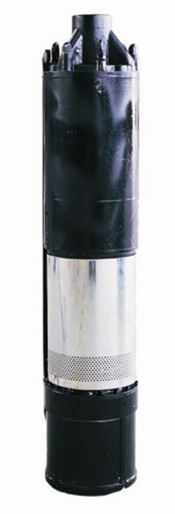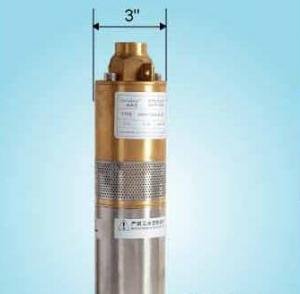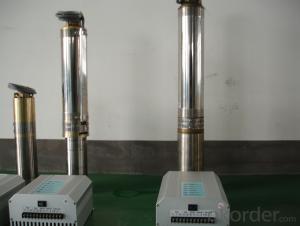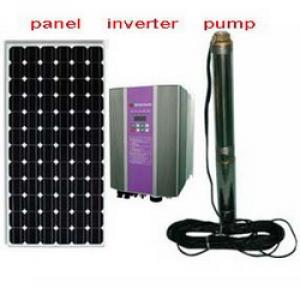12V DC Solar Water Pump 3DS-6-70
- Loading Port:
- China Main Port
- Payment Terms:
- TT OR LC
- Min Order Qty:
- -
- Supply Capability:
- 300 sets /month
OKorder Service Pledge
OKorder Financial Service
You Might Also Like
Product description:
Product: Solar water pump
Model:3DS-6
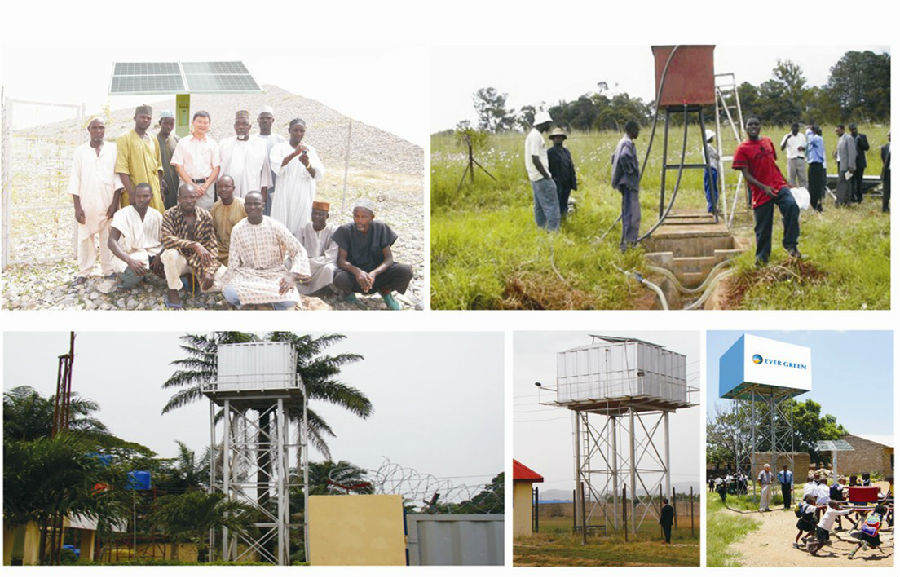 Appilication:
Appilication:
submersible pump
for deep well near a village or small farm
for drinking water of one village (100-300 people)
for watering a small farm
Product specification:
flow rate:1000 liter/ hour, 8000m3/day.
lift: 10m-70m
pump diameter: 140mm
well diameter more than 150mm
with BLDC motor, motor power:600W
but only need solar power:230W, our pump can save more than 50% solar panel power.
Material:
Pump inside: stainless steel and wearable nylon,it enables our solar pump to have 10 years sevice life.
Motor length:15cm,80% shorter than other motors. So that you can pump 80% more water by our solar pump.
Certification:
3 International patent
ISO9001
CE
Warranty:2 years
- Q: Can a solar pump be used for wastewater recycling?
- Yes, a solar pump can be used for wastewater recycling. Solar pumps are an environmentally friendly and cost-effective solution for pumping water, including wastewater, using solar energy. By utilizing solar power, these pumps can help in the process of recycling wastewater for various purposes such as irrigation, industrial uses, or even for non-potable water needs.
- Q: Can a solar pump be used for water supply in oil refineries or petrochemical plants?
- Yes, a solar pump can be used for water supply in oil refineries or petrochemical plants. Solar pumps are highly versatile and can be used in various industrial applications, including providing water for industrial processes in oil refineries and petrochemical plants. They offer a sustainable and cost-effective solution by harnessing solar energy to power the pumps, reducing reliance on traditional energy sources and minimizing operational costs. Additionally, solar pumps are often designed to be highly reliable and can operate in remote locations with minimal maintenance requirements, making them suitable for the specific needs of oil refineries and petrochemical plants.
- Q: How does the type of pump (submersible, surface, centrifugal) affect the performance of a solar pump?
- The performance of a solar pump can be greatly influenced by the type of pump used, namely whether it is submersible, surface, or centrifugal. A submersible pump is specifically designed to be submerged in the water source, like a well or borehole. This type of pump has the advantage of being able to push water to higher elevations, making it suitable for applications that involve pumping water from deep wells. Additionally, the submersible design helps to reduce energy losses as the pump is already immersed in the water, eliminating the need for long suction pipes. Consequently, a submersible solar pump can operate efficiently and effectively by harnessing the available solar energy to pump water to desired heights. On the contrary, a surface pump is installed above the water source and relies on suction to draw water into the pump. This type of pump is commonly used for shallow water sources, such as ponds or lakes. However, since the pump needs to create suction in order to pull water, it may require more energy compared to a submersible pump. The performance of a solar pump with a surface pump design can be negatively affected if the suction lift required is too high or if there are any leaks in the suction pipes, resulting in energy losses and reduced efficiency. Centrifugal pumps are commonly used in both submersible and surface pump designs. These pumps utilize rotating impellers to generate centrifugal force, which propels the water towards the pump outlet. The performance of a solar pump with a centrifugal pump design depends on various factors, such as the size of the impeller, pump efficiency, and system design. If the centrifugal pump is properly matched to the power output of the solar array, it can deliver high flow rates and efficiently pump water over long distances. However, if the pump is not appropriately sized or if the system design is not optimized, it may result in diminished performance and energy inefficiencies. In conclusion, the choice of pump type in a solar pumping system (submersible, surface, or centrifugal) can have a significant impact on its performance. Factors such as the depth of the water source, lift requirements, distance to pump water, and system design should all be taken into account when selecting the most suitable pump type for a solar pump.
- Q: Can a solar pump be used for water supply in remote research stations?
- Yes, a solar pump can be used for water supply in remote research stations. Solar pumps are efficient and reliable, harnessing energy from the sun to power the pump and provide a sustainable water supply. This is particularly beneficial in remote areas where access to electricity may be limited or non-existent. The use of solar pumps reduces dependency on traditional energy sources and helps overcome logistical challenges in providing water to research stations located in remote locations.
- Q: How do solar pumps handle water with high ammonia or chemical content?
- Solar pumps are not specifically designed to handle water with high ammonia or chemical content. However, some solar pump systems may include additional filtration or treatment mechanisms to address such water quality issues. It is crucial to consult with the manufacturer or a water treatment expert to determine whether a solar pump can effectively handle water with high ammonia or chemical content, and if any modifications or pre-treatment steps are necessary.
- Q: What is the payback period for a solar pump system?
- The payback period of a solar pump system can vary based on several factors, including the initial cost, energy savings, and local electricity rates. Typically, the payback period falls within the range of 3 to 8 years. In other words, it takes between 3 to 8 years for the energy cost savings to equal the initial investment. However, it is worth noting that the lifespan of a solar pump system can be 20 to 30 years. Therefore, even after the payback period, the system continues to offer significant energy cost savings. Furthermore, considering the potential rise in electricity rates over time, the payback period may potentially be shorter. To sum up, investing in a solar pump system can yield a relatively quick payback period and long-term financial advantages.
- Q: What is the expected maintenance schedule for a solar pump?
- The expected maintenance schedule for a solar pump can vary depending on several factors such as the type and model of the pump, the quality of components used, the environmental conditions it operates in, and the level of usage. However, in general, a solar pump requires minimal maintenance compared to traditional pumps due to its simple design and reliance on renewable energy. Routine maintenance for a solar pump typically involves the following tasks: 1. Regular cleaning: The solar panels should be kept clean and free from dust, dirt, and debris to ensure optimal sunlight absorption and maximum efficiency. Cleaning can be done with a soft cloth or sponge and mild detergent, avoiding abrasive materials that may scratch the surface. 2. Inspection of wiring and connections: It is important to periodically inspect the electrical wiring and connections to ensure they are secure and free from any signs of wear or damage. Loose or faulty connections can lead to reduced performance or system failure. 3. Checking water levels: Depending on the type of solar pump and its application, regular monitoring of water levels may be necessary. This is especially important for pumps used in irrigation systems or remote water supply, as low water levels can cause the pump to overheat or run dry, potentially damaging the motor or pump components. 4. Lubrication: Some solar pumps may require occasional lubrication of moving parts, such as bearings or seals. This will help prevent friction and ensure smooth operation. It is essential to use the recommended lubricant and follow the manufacturer's guidelines for proper application. 5. Battery maintenance: For solar pumps with battery backup systems, it is crucial to monitor and maintain the batteries. This includes checking the charge level, cleaning battery terminals, and replacing batteries if necessary. Proper battery maintenance is essential for consistent pump performance, especially during periods of low sunlight or at night. 6. Professional servicing: While routine maintenance can be carried out by the user, it is recommended to have a professional service the solar pump periodically. This allows for a thorough inspection, testing of system components, and identification of any potential issues that may require attention. It is important to note that the specific maintenance requirements for a solar pump may be outlined by the manufacturer in the user manual or documentation. Following the recommended maintenance schedule and guidelines provided by the manufacturer will ensure optimal performance and longevity of the solar pump.
- Q: What is the expected warranty coverage for the various components of a solar pump system?
- The expected warranty coverage for the various components of a solar pump system can vary depending on the manufacturer and specific product. However, generally, solar panels may come with a warranty of 25 years or more, while the pump itself may have a warranty ranging from 1 to 5 years. The warranty coverage for other components like inverters, controllers, and batteries may also vary but typically falls within the range of 1 to 10 years. It's important to review the warranty terms and conditions provided by the manufacturer to determine the specific coverage for each component.
- Q: How do I ensure the compatibility of a solar pump with my existing water infrastructure?
- To guarantee the compatibility of a solar pump with your current water infrastructure, there are several important factors to bear in mind: 1. Power Requirements: Verify the power requirements of your existing water infrastructure and compare them to the power output of the solar pump. Make sure that the solar pump can generate enough power to meet the demands of your water system. 2. Size and Capacity of the Pump: Ascertain the size and capacity of your present water system and select a solar pump that can handle the necessary volume. Take into consideration factors like the depth of the water source, the distance the water needs to be pumped, and the desired flow rate. 3. Pumping Method: Understand the pumping method employed in your current water infrastructure and confirm that the solar pump is compatible with it. For instance, if your current system utilizes a submersible pump, you need to opt for a solar submersible pump that can be easily integrated into your setup. 4. Plumbing and Connection: Evaluate the plumbing and connection requirements of your water infrastructure. Ensure that the solar pump possesses the necessary fittings and connections to seamlessly integrate with your existing plumbing system. If needed, consult with a professional plumber to ensure a proper fit. 5. Monitoring and Control: Consider whether you have any monitoring or control systems in place for your current water infrastructure. Some solar pumps come with built-in monitoring and control features, enabling easy integration with your existing setup. Ensure compatibility or explore additional solutions that effectively monitor and control the solar pump. 6. Seek Expert Advice: If you have any doubts about compatibility, consult with a professional who has expertise in solar pumps and water infrastructure. They can examine your setup and provide recommendations on suitable solar pump options that will smoothly integrate with your existing infrastructure. By taking these factors into account and seeking expert guidance when necessary, you can ensure the compatibility of a solar pump with your existing water infrastructure, resulting in an efficient and sustainable water pumping system.
- Q: Is it possible to store excess solar energy generated by the pump?
- Excess solar energy generated by the pump can indeed be stored. The use of batteries is a common method for storing this surplus energy. Throughout the day, these batteries gather and retain the excess energy, which can then be discharged during periods when the pump fails to generate sufficient energy, such as at night or on cloudy days. Furthermore, alternative energy storage technologies, including thermal energy storage and hydrogen fuel cells, can also be employed to stockpile excess solar energy for subsequent use by the pump. These storage solutions enable a more effective and dependable utilization of solar energy, guaranteeing the pump's operation even in the absence of direct sunlight.
Send your message to us
12V DC Solar Water Pump 3DS-6-70
- Loading Port:
- China Main Port
- Payment Terms:
- TT OR LC
- Min Order Qty:
- -
- Supply Capability:
- 300 sets /month
OKorder Service Pledge
OKorder Financial Service
Similar products
Hot products
Hot Searches
Related keywords

